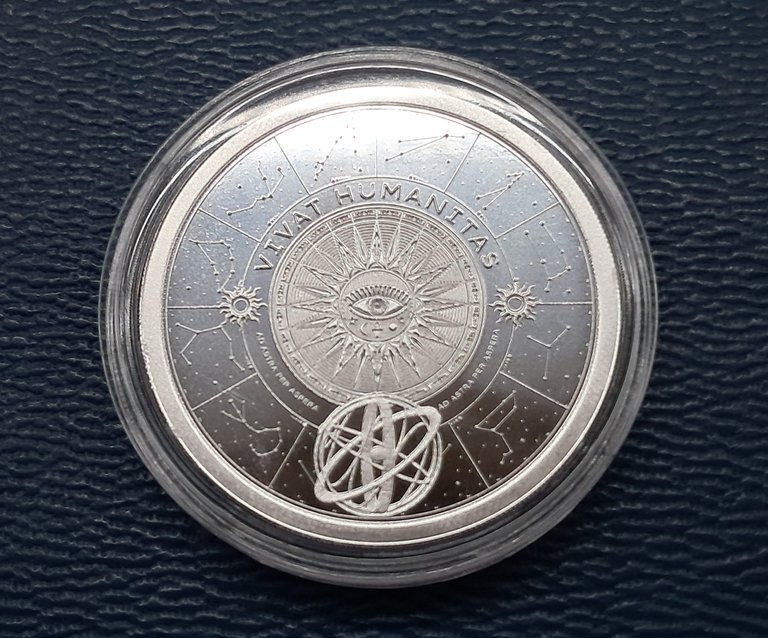
Some time ago I showed here the series of the Czech Mint "Vivat Humanitas". This coin belongs to this series. I think it's a nice coin. But I included it just to draw attention to the article, to attract readers' interest.
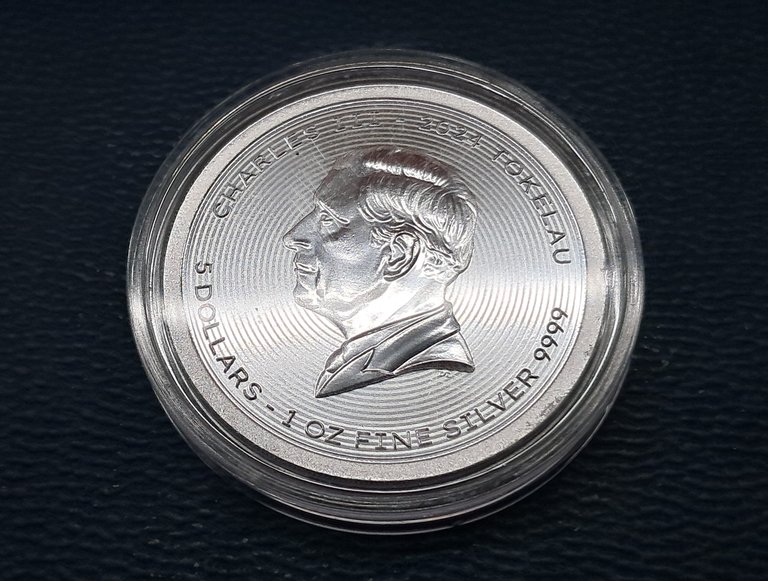
The coin was issued for the Tokelau Territory in the denomination of $5 with a standard weight of 1 ounce of silver.
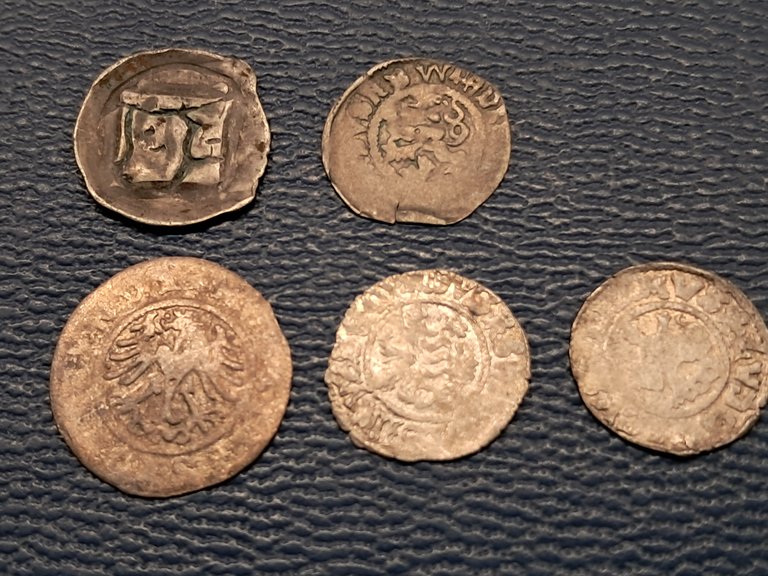
My intention is to show these coins. They're kind of outside my collection. I acquired them by accident, I don't even know how. I collect coins of the tolar to crowns period, roughly 1526-1918. These coins are older.
These are small coins of the 15th - early 16th century. They date from the groschen period, which lasted from about 1300 to 1526.
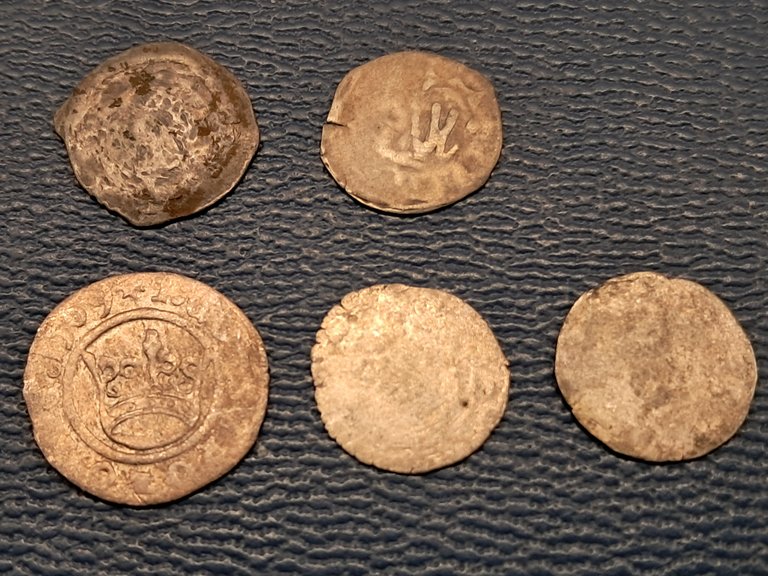
These coins are often only one-sided. Whole bags of these coins were used for larger payments. A large number of them were needed, which is why they are often minted only in a loose way.
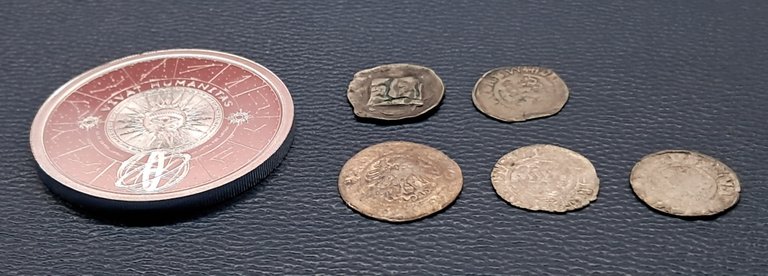
The focus of my article today lies in this photograph. A comparison of a modern and an almost medieval coin. Can you see at a glance the difference in size and weight? And yet each of those small coins had more purchasing power in their day than the modern ones do today.
During the 16th century, what later historians called the price revolution swept the world. All goods became sharply more expensive. For about 70 years historians have known that goods did not become more expensive, but money became cheaper because the price of gold and silver plummeted. And I ask myself if something like that can happen again today.
At that time, new mines were discovered on the American continent. Cheap, essentially slave, labour from the local population was used to work there. At the same time, a new method of extracting silver from ore was discovered - cold amalgamation.
We all believe that humanity will continue to increase, the demand for gold and silver will steadily increase, and the amount of silver and gold available for mining will decrease. And therefore the prices of both commodities will rise. Does it really have to be this way?
Global warming is happening all around us. For about 15,000 years. Ever since the ice age ended. I don't think it's in humanity's power to reverse the process. Although many argue that we should try. But that's getting into the realm of politics, which I don't want to get into.
Suppose all the glaciers melt. Aren't there potential gold and silver deposits in Greenland and Antarctica?
Is it not possible that mankind has invented some new, cheaper method of extracting these metals from the seabed, for example?
Will some new supermaterial, perhaps biologically grown using nanotechnology, emerge to replace precious metals in industry?
And finally, won't humanity begin to decline? As the education of parents increases, the number of children in the family decreases. And all it takes is one major world war or a truly deadly epidemic for the demand for precious metals to fall with the number of people.
Last question. Last question. Do you also have such thoughts, or am I just crazy?

Thank you for stopping by, thank you for reading, thank you in advance for your comments. Of course, I welcome any form of support.
The English translation is thanks to Deepl.com. The original version in Czech is below the picture.

😀Zlevní stříbro?😀
Před časem jsem zde ukazoval sérii České mincovny „Vivat Humanitas“. Tato mince patří do této série. Myslím, že je to pěkná mince. Ale zařadil jsem ji jen proto, abych na článek upozornil, abych přitáhl zájem čtenářů.
Mince byla vydána pro území Tokelau v nominální hodnotě 5 dolarů o standardní hmotnosti 1 unce stříbra.
Mým záměrem je ukázat tyto mince. Jsou tak trochu mimo mou sbírku. Získal jsem je náhodou, už ani nevím jak. Sbírám mince z tolarového až korunového období, zhruba 1526-1918. Tyhle jsou starší.
Jedná se o drobné mince z 15. - počátku 16. století. Pocházejí z grošového období, které trvalo přibližně od roku 1300 do roku 1526.
Ty mince jsou často jen jednostranné. Při větších platbách se používali celé pytle těchto mincí. Byla jich potřeba velká spousta, a proto jsou často ražené jen ledabyle.
Těžiště mého dnešního článku spočívá v této fotografii. Srovnání moderní a skoro středověké mince. Vidíte na první pohled rozdíl ve velikosti a váze? A přeci každá z těch malých mincí měla ve své době větší kupní sílu než dnes ta moderní.
Během 16.století proběhlo světem cosi, co pozdější historikové nazvali cenovou revolucí. Všechno zboží prudce zdražilo. Asi 70 let historici vědí, že zboží nezdražilo, ale zlevnily peníze, protože prudce klesly cena zlata a stříbra. A já se ptám sám sebe, jestli se něco takového může dnes zopakovat.
Tehdy byly objeveny nové doly na Americkém kontinentě. Na práci tam byla používína levná, v podstatě otrocká, práce místního obyvatelstva. Současně byla objevena nová metoda získávání stříbra z rudy - amalganizace za studena.
Všichni věříme, že lidstvo se bude i nadále rozrůstat, poptávka po zlatě a stříbře se bude neustále zvyšovat a množství stříbra a zlata, které je k dispozici pro těžbu, se bude snižovat. A proto ceny obou komodit porostou. Opravdu to tak musí být?
Globální oteplování probíhá všude kolem nás. Už asi 15 000 let. Od konce doby ledové. Nemyslím si, že je v silách lidstva tento proces zvrátit. I když mnozí tvrdí, že bychom se o to měli pokusit. Ale to už se dostáváme do oblasti politiky, do které se mi nechce.
Předpokládejme, že všechny ledovce roztají. Nejsou v Grónsku a Antarktidě potenciální ložiska zlata a stříbra?
Není možné, že by lidstvo vynalezlo nějakou novou, levnější metodu těžby těchto kovů například z mořského dna?
Nevznikne nějaký nový supermateriál, třeba biologicky vypěstovaný pomocí nanotechnologií, který by mohl nahradit drahé kovy v průmyslu?
A konečně, nezačne lidstva ubývat? S rostoucím vzděláním rodičů klesá počet dětí v rodině. A stačí jedna velká světová válka nebo skutečně smrtící epidemie, aby poptávka po drahých kovech klesla spolu s počtem lidí.
Poslední otázka. Taky Vás napadají takové myšlenky, nebo jsem jen já šílenec?
Děkuji, že jste se zastavili, děkuji, že jste četli, a předem děkuji za vaše komentáře. Samozřejmě uvítám jakoukoli formu podpory.

